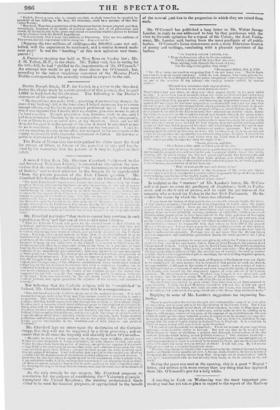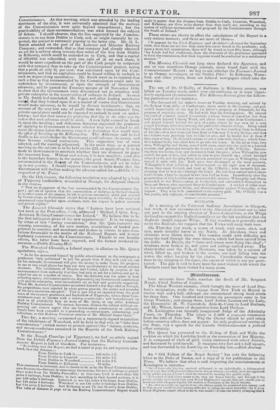A meeting in Cork on Wednesday was the most important
pro- ceeding that has yet taken place in regard to the report of the Railway
Commissioners. At that meeting, which was attended by the leading merchants of the city, it was universally admitted that the motives of the Commissioners were quite beyond impeachment ; but the practicability of their recommendations was what formed the subject of debate. I should observe, that the line suggested by the Commis- sioners is to run from Dublin to Cork, and, as might naturally be ex- pected, the project is extremely popular in the latter city. Mr. G. L.
Smith attended on the part of the Leinster and Munster Railway Company; and contended, that as that company had already obtained
an act for a railway along seventy-four miles of the line from Dublin to Kilkenny, which could be extended on to Cork, and that a capital of' 800,0001. was subscribed, with two calls of 51. on each share, it would be more expedient on the part of the Cork people to coliperate with that company than to take up the Commissioners' project, seeing that a profit of only 3k per cent. was calculated upon by the Com- missioners, and that no capitalists coald be found willing to embark in such an unpromising speculation. Mr. Smith went on to contend that such a line as that recommended by the Commissioners could only be undertaken by Government, or upon the strength of Government advances; and he quoted the Treasury minute of 3d November 1836, to show that the Government were determined not to interfere with private enterprise in the construction of railways in Ireland. As soon as Mr. Smith had concluded, Mr. Fagan and other leading merchants stated, that they looked upon it as a matter of course that Government would make advances, to be repaid by distant instalments ; that, on account of the very low rate of profit from the Commissioners' line, private speculators could not be expected to embark in such an under- taking; and that their reasorafiir preferring that line to the other was the notion that such advances would be made. A new light seemed to break in upon the meeting ; and Alderman Spearing suggested the prudence of applying to Government to know whether they were inclined to ad. tunice the money &fore the meeting came to a declaration that would have the effect of knocking up the Kilkenny line. The Alderman said he had doubts in his mind whether the Government would advance the money, and thus become railroad contractors. This suggestion was at once adopted, and the meeting adjourned. In the mean time, as a general meeting on the subject is to be held on the :22d, an application is to be made to Government to ascertain whether they are disposed to grant the necessary loan. Without such a loan, it is now manifest, (and this is the important feature in the matter,) the great South-Western line, recommended in the Report of the Commissiorers, will not be taken vp in any quarter. I should suppose there can he little doubt that the Government will decline making the advance called for. —Dublin Cur- respondent of the Times.
On the 11th instant, the following resolution was adopted by a ho,!y of Tipperary landholders, assembled at Nenagh, Sir Amyrald Dancer in the chair- " That we disapprove of the line recommended by the Commissioners' Re- port ; and are of opinion that the construction of railways in Ireland should, as in other parts of the empire, be left to private enterprise, aided and assisted by Goveroment, as Pailiament should decide upon according to the usual and accustomed rules founded upon evidence, with due regard to pubic interests and private rights."
The Limerick Chronicle states that " Letters have been received last week at the Post-office, Cork, addressed Michael J. Quits, Esq., Assistant RailwayCommissioner for Ireland." We believe this to be the first intimation given of the new appointment.' It is, we suppose, by virtue of this "roving commission," that Mr. Quin traverses the country, convening, of his own motion, assemblages of landed pto- prietors in counties, and merchants and traders in towns, to pass reso- lutions favourable to the merits of the Railroad Report, and bestow laudatory comments on the Commissioners. Thanks to our humble efforts, the latter have been exposed, and the former rendered in- nocuous.—Dublin Evening Mail.
The Waterford Chronicle, a Liberal paper, in allusion to Mr. Quin's operations, says- " As he has announced himself by public advertisement in the newspapers a gentleman 'duly authorized' to tell the people that if they will only cry out for his railroads, Government will give the money to make them, his progress in one or two small places has been not very unsatisfactory to his weak•minded retainers. The inhabitants of Thurles and Cashel, taken by surprise at the announcement from authority that they had only to ask for a railway and get it, asked for one as a matter of course. But the delusion was too gross to bear reflecting upon; and counter-petitions, deprecating any Government interference with private enterprise, were immediately set on foot and generally supported. When Mr. Assistalit Commissioner presented himself a few days after at Nenagh, his propositions were rejected by every person present, the mover and seconder of his own resolution excepted ! This is just what we expected from the good setae of the country gentlemen and freeholders of Tipperary, whom these Com- missioners want to burden with a railway county-rate; and henceforward we shall in all probability hear no more of Mr. Quin, or any other Assistant Railway Commissioner. We cannot, however, dismiss the subject without ex- pressing our sincere regret that any Government countenance or authority should have been extended to a proceeding so extravagant, unbecoming, and ridiculous, as this Railway Precursor mission of Mr. Michael James Quin."
This day, a meeting, summoned on a numerously-signed requisition of the inhabitants of Waterford, will be held in that city, to " tuke into consideration " (which means to protest against) the "nature, contents, and recommendations contained in the Reports of the Irish Railway Commissioners."
In the Nenagh Guardian (of Tipperary), we find an article copied from the Dublin Freeman's Journal :toting that the Railway Commis- saunters' Report is full of blunders. For instance- " In looking over the Report we find it stated at page 44, and regularly tabu- lated, that the distance—
From Dublin to Cork is From Dublin to Limerick 166 miles f. 5
12 miles 4 f.
From Dublin to Waterford 5
141 miles 2 f.
From Dublin to Kilkenny 79 miles.
This statement is incorrect, and is shown to be so by the Royal Commissioners' own documents—because in examining the sections, the zero of mileage is placed three miles from the Dublin Post-office: in that case, Cork is more than 166 miles 5 furlongs, from Dublin; in fact, according to their figured sections, it hi just 169 miles 5 furlongs. Limerick is not 125 miles 4 furlongs, from Dublin, but 12S miles 4 furlongs. Waterford is not 141 miles 2 furlongs from Dublin, but 144 wiles 2 furlongs. And Kilkenn • is not 79, but 82 miles from Dublin. make it appear that the distance from Dublin to Cork, Limerick, Waterford, and Kilkenny, are three miles shorter than they really are, according to the system of railways recommended and proposed by the Commissioners through the South of Ireland."
These errors are shown to affect the calculations of the Report in a very serious manner; and there are more of them- " It appears by the Civil Engineer and Architect's Journal for September lt338, that there are not less than sixty-five errors found in the gradients; and, upon a more full examination, there will be found at least fifty more, although 'my Lords bad full confidence, from the character of the gentlemen appointed to form the commission, that their inquiries would be conducted in a satisfactory manner.'" The Morning Chronicle not long since declared the Spectator, and one or two scurrilous Orange journals, alone found fault with the Commissioners' Report : we beg to ask, whether the Freeman's Journal is an Orange newspaper, or the Dublin Pilot In Kilkenny, Water. ford, and other places, there are Liberal newspapers which take the same side.



























 Previous page
Previous page